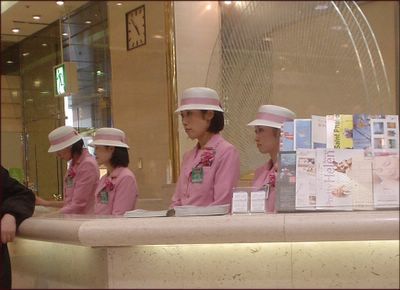 Frank Lloyd Wright's Falling Water is Mr Yokoi's favorite.
Frank Lloyd Wright's Falling Water is Mr Yokoi's favorite.
Tuesday, March 28, 2006
Wednesday, March 22, 2006
Tuesday, March 21, 2006
Ramblings or Rumblings on Spiritual Warfare
In our latest prayer letter I wrote about warfare. I used the analogy of a physical battle and likened it to the spiritual. It is a fairly common analogy but quite apt, and it describes quite well how I currently feel, how I currently understand a part of my worldview.
The book by CS Lewis titled The Screwtape Letters is an interesting analogy about an apprentice demon, being instructed in the art of temptation and other useful spiritual warfare tools. An excellent book, but written for the Western audience. I would love to read the same thing written for Japan. It would take great understanding of both culture and the bible to write a book like it for Japan.
The art of our enemy's warfare seems to take on two forms, by open and aggressive attack or by sneaky and quiet seduction. The attack in Japan is often mounted on the emotional front. Discouragement, blueness or depression, or other mental maladies. I am still trying to get my head around the spiritual battle plans, the shape of the assault in Japan. I am still trying to get a handle on things, wondering what to expect, how to endure attack, how best to pray, how best to stand firm, and to respond to the workings of Satan.
In our prayer letter from a little over a year ago I wrote about needing the support of many Christians while we are undertaking this assignment here in Japan. I used an analogy of a wedge and how the tip of the wedge is nothing without the support in the bigger part of the wedge. You will know if you have ever tried to drive a wedge into something, that you need the whole of the wedge and not just the tip.
After reading the letter I wrote about discouragement, my sister sent an e-mail to encourage me. She wrote:
The book by CS Lewis titled The Screwtape Letters is an interesting analogy about an apprentice demon, being instructed in the art of temptation and other useful spiritual warfare tools. An excellent book, but written for the Western audience. I would love to read the same thing written for Japan. It would take great understanding of both culture and the bible to write a book like it for Japan.
The art of our enemy's warfare seems to take on two forms, by open and aggressive attack or by sneaky and quiet seduction. The attack in Japan is often mounted on the emotional front. Discouragement, blueness or depression, or other mental maladies. I am still trying to get my head around the spiritual battle plans, the shape of the assault in Japan. I am still trying to get a handle on things, wondering what to expect, how to endure attack, how best to pray, how best to stand firm, and to respond to the workings of Satan.
In our prayer letter from a little over a year ago I wrote about needing the support of many Christians while we are undertaking this assignment here in Japan. I used an analogy of a wedge and how the tip of the wedge is nothing without the support in the bigger part of the wedge. You will know if you have ever tried to drive a wedge into something, that you need the whole of the wedge and not just the tip.
After reading the letter I wrote about discouragement, my sister sent an e-mail to encourage me. She wrote:
Hey, this is interesting. I am in a study group on Sunday mornings and we are studying the book of Acts. We are at chapter 19 at this point and the topic of spiritual warfare is mentioned. A "blurb" from the study guide says this; "What should the Christian's response to spiritual warfare be? For starters, it should include prayer for the Spirit's guidance, wisdom and protection, including direction in avoiding an excessive interest in forces of evil. We should be in prayer not only for ourselves, but also for others who may be caught in the midst of spiritual battles, especially missionaries. It has often been observed that the devil works furiously where the Spirit is breaking new ground, whether at home or in other lands and cultures." This to me was a very, shall we say, uplifting paragraph. In terms of your latest newsletter, it means that Satan is worried if he is flooding you with discouragement. Sock it to 'im.
Saturday, March 18, 2006
Memoirs of a short time ago.

Sometime ago;
A friend of ours named Emiko who is originally from Osaka but now lives in Yokohama dropped by to visit us. She had recently been to China (on business) and brought us a little Omiyage (a souvenier). She purchased several copies of Memoirs of a Geisha (in Japan its called Sayuri) on DVD on the streets of Shanghai for about a dollar each, to bring back for friends. I found the jacket of the DVD to be interesting reading. The graphics of the front cover are decent, even after looking closely at the artwork one does not realize that it is a bootleg. The DVD itself too was better quality than I expected it to be, it only crashed in a couple of places during playback. We managed to massage it so that we could watch the entire movie. I realized that the movie was a bootleg when I read the back cover. It made me laugh. While I cannot read the Chinese credits (I think they are correct) it looks like the English credits were scanned and then piped through some character recognition software. These credits are from the movie Fight Club which can almost be classified as an old movie now. I imagine the bootleggers always use the same English credits when the put together their jackets. The real tipoff however was when I read the text which would normally describe the storyline, or pitch the movie for those who enjoy reading the fine print. In the fine print the writer flames what I assume to be a rival bootlegger. It too made interesting reading.
Wednesday, March 15, 2006
Thursday, March 09, 2006
Memoirs of a gakusei.
As an alumni of the Georgetown District Christian School, I regrettably will not be able to attend the 40th Anniversary Celebration which is coming up on Saturday April 29.
In preparation the organizers are looking for memories of those years. For me there are quite a lot of good memories (*) but one in particular relates to Japan as well.
I recently had to write an essay in Japanese about a former teacher, and I wrote about Miss Groat. It is nice to rehash this topic in English, as it is very difficult to write about something with such a limited Japanese vocabulary. Two things readily come to mind about Miss Groat. I remember that occasionally I would play chess against Miss Groat during our lunch time. I always won except for the last time we played, when we drew. The other thing I remember was Miss Groat's tally system in Grade four. If we talked in class or did something that was improper Miss Groat would turn our happy face around to the black side. If something else happened then we got a tally, a little orange strip of paper to go with our turned around happy face. When you built up three tallys (four strikes altogether) you received the big prize, Heat for the Seat. In Japanese there is more than one word for receiving something, depending on the social relationship of the giver and the receiver. Since I was a student receiving Heat for the Seat from my Sensei (teacher), the way I would say it in Japanese roughly translates as "I was honoured and privileged to receive Heat for the Seat from my teacher". I must say the only thing I remember feeling honoured was my behind.
In preparation the organizers are looking for memories of those years. For me there are quite a lot of good memories (*) but one in particular relates to Japan as well.
I recently had to write an essay in Japanese about a former teacher, and I wrote about Miss Groat. It is nice to rehash this topic in English, as it is very difficult to write about something with such a limited Japanese vocabulary. Two things readily come to mind about Miss Groat. I remember that occasionally I would play chess against Miss Groat during our lunch time. I always won except for the last time we played, when we drew. The other thing I remember was Miss Groat's tally system in Grade four. If we talked in class or did something that was improper Miss Groat would turn our happy face around to the black side. If something else happened then we got a tally, a little orange strip of paper to go with our turned around happy face. When you built up three tallys (four strikes altogether) you received the big prize, Heat for the Seat. In Japanese there is more than one word for receiving something, depending on the social relationship of the giver and the receiver. Since I was a student receiving Heat for the Seat from my Sensei (teacher), the way I would say it in Japanese roughly translates as "I was honoured and privileged to receive Heat for the Seat from my teacher". I must say the only thing I remember feeling honoured was my behind.
Tuesday, March 07, 2006
Five Hundred Year Questions
Today, a quick link. I happened upon it via Gideon Strauss' recent post. Makoto Fujimura has posted an interesting blog.
Taking into account the circumstances in which I currently find myself, I see the five hundred year old question in light of an old established culture, Japan. And I see Andy Warhol's fifteen seconds of fame in light of a much newer and less established culture in North America.
I find the juxtaposition intriguing, especially in the light of my current vocation.
As a Canadian and as a Christian immersed in this experienced land, I am staggering about under the weight of trying to grasp, trying to get my mind around many five hundred year old questions.
It can be taxing.
Taking into account the circumstances in which I currently find myself, I see the five hundred year old question in light of an old established culture, Japan. And I see Andy Warhol's fifteen seconds of fame in light of a much newer and less established culture in North America.
I find the juxtaposition intriguing, especially in the light of my current vocation.
As a Canadian and as a Christian immersed in this experienced land, I am staggering about under the weight of trying to grasp, trying to get my mind around many five hundred year old questions.
It can be taxing.
Saturday, March 04, 2006
Unravelling the Oki Doki
When I was still in Canada working for the esteemed PROMAT Engineering Sales Inc. My good buddy and former associate, (not to mention president of the company), Dave Lewis (the head honcho, the big cheese, the shachyo as it were) asked me if oki doki was Japanese. I had to confess I didn't know. Since then I have been searching, diligently studying the culture and the language in search of the answer.
Thus far in my quest I have not been able to discover the meaning of oki doki, however, in my studies of the Japanese language this past semester, I have discovered that the words ooki tokei could be construed to mean "large clock". But after further examination I have also concluded that they are not related in any way to oki doki.
Further, one of my classmates this past semester bore the moniker Toki. Toki-san is sixteen, was born in China, went to an English speaking highschool, but his mother is Korean and currently Toki is living in Japan. As a result Toki speaks Madarin and English, can understand a bit of Korean, and now is the most fluent of all the people in our Japanese Class. Toki however bears no resemblance to either a large clock or an oki doki, (although I cannot yet be sure of that last statement). On the other hand, at the commencement of our semester yesterday, the departing students all received a "parting gift" (to quote Bob Barker) and since Toki is off to high school, he too received said parting gift. It turned out to be an ooki tokei which understandably made Toki mad. Of course everyone knows that in Chinese culture, giving a clock as a gift implies that you want to see the person die. I have not yet finished processing the ramifications of these recent developments in my quest but I shall not rest until I can intelligently unravel this particular oriental mystery.
Thus far in my quest I have not been able to discover the meaning of oki doki, however, in my studies of the Japanese language this past semester, I have discovered that the words ooki tokei could be construed to mean "large clock". But after further examination I have also concluded that they are not related in any way to oki doki.
Further, one of my classmates this past semester bore the moniker Toki. Toki-san is sixteen, was born in China, went to an English speaking highschool, but his mother is Korean and currently Toki is living in Japan. As a result Toki speaks Madarin and English, can understand a bit of Korean, and now is the most fluent of all the people in our Japanese Class. Toki however bears no resemblance to either a large clock or an oki doki, (although I cannot yet be sure of that last statement). On the other hand, at the commencement of our semester yesterday, the departing students all received a "parting gift" (to quote Bob Barker) and since Toki is off to high school, he too received said parting gift. It turned out to be an ooki tokei which understandably made Toki mad. Of course everyone knows that in Chinese culture, giving a clock as a gift implies that you want to see the person die. I have not yet finished processing the ramifications of these recent developments in my quest but I shall not rest until I can intelligently unravel this particular oriental mystery.
Wednesday, March 01, 2006
Coincidental Eeyore

A while ago we received in the post, a package from my Uncle Andy. The package contained a little stuffy named Eeyore. Eeyore originally hails from Surrey, British Columbia, where he lives with Caleb, a grade six student at Surrey Christian School. Eeyore wanted to travel the world and so Caleb sent him away with friends. I don't know exactly where he as been so far, but I know he was in the northwest states with someone who happens to be my former grade six teacher when I went to Georgetown District Christian School. (Is it coincidence?) After that Eeyore made his way to my Uncle's place in Georgetown Ontario. From there Eeyore hopped a plane to Osaka Japan. While in Japan, Eeyore accompanied my wife Aukje to English Class where the lesson she was teaching happened to be about a stuffed animal who is supposedly travelling the world on behalf of a Japanese man who died before he could fulfil his dream. The students thought Aukje was making this story about Eeyore up, it was way too much of a coincidence to be true.
When Eeyore first arrived here we found out he really wanted to see China. As it happens a classmate of mine, Furui Kim San (real name: Kim Tae Sun) who is Korean, was returning to his university in China. With the help of another classmate, Sandra, who speaks both English and Korean (and by another odd coincidence grew up in Surrey just a couple of blocks from Surrey Christian School) I relayed that Eeyore wanted to go to Korea and China and asked him if he could help out. He was delighted to help out and by now Eeyore should be touring China. I don't know where else Eeyore will end up on his adventure but I am certain he is having a fun time.
Subscribe to:
Comments (Atom)

